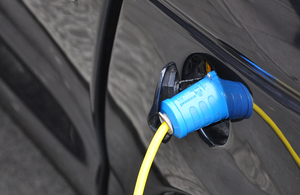Government charges ahead in car fleet transition to electric vehicles
Target reached to switch over a quarter of all government cars to ultra-low emission vehicles.

Plug-in vehicle
The government is powering forward towards decarbonising its central car fleet, as it has been confirmed today (19 January 2023) that it hit its target in switching over a quarter of all its cars (25.5%) to ultra-low emission vehicles (ULEV).
Having a higher rate of ULEV vehicles in its fleet means the government is on track to meet its 2027 target for the entire fleet be fully zero emission.
As set out in the Department for Environment, Food and Rural Affairs’ Greening government commitments in 2021 to 2025, the government was required to transition a minimum of a quarter of its car fleet to ultra-low emission vehicles by the end of 2022. As of the latest data from September, 25.5% of all central government cars were ultra-low emission vehicles, reaching the target 3 months ahead of schedule.
Technology and Decarbonisation Minister Jesse Norman said:
As the UK moves towards a cleaner transport network, the government is doing its part, with over 25% of its central car fleet being battery-powered 3 months earlier than planned.
It’s critical that progress in decarbonising fleets is matched elsewhere. We will continue to forge ahead, to complete the switch by 2027 and help make the UK a world leader in decarbonisation.
With the electric vehicle (EV) sector showing year-on-year growth, today’s announcement demonstrates the government’s commitment to decarbonising its own vehicle fleet. The target is just a first milestone as government looks to decarbonise the entirety of its central car and van fleet to zero emission vehicles by 2027 – faster than the wider phase-out date, which sees the sales of new petrol and diesel cars banned by 2030.
Across the wider market, the UK continues to lead the way in transitioning to battery-powered cars, as 1 in 5 cars sold in 2022 had a plug. According to the latest industry statistics from the Society of Motor Manufacturers and Traders, sales of EVs overtook those of diesel in 2022 for the first time.
With a burgeoning EV sector, the government has also made great strides in boosting the charging network. The £10 million Local electric vehicle infrastructure (LEVI) pilot, part of the wider LEVI fund, is expected to deliver 1,000 local chargepoints across England, with 9 local authorities receiving funding. Winning projects are supported by an additional £9 million in private funding. This will improve access to EV chargers, particularly for residents without off-street parking, supporting the nation’s uptake of zero emission vehicles.
The government is committed to ending the sales of new petrol and diesel cars by 2030 as we work towards a carbon-free transport network.
Roads media enquiries
Media enquiries 0300 7777 878
Switchboard 0300 330 3000